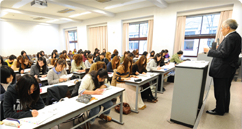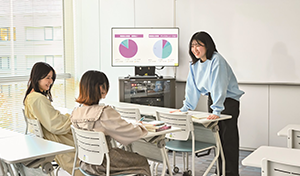- UNIVERSITY
- Faculty of Social Information Studies
- Department of Social Information Studies

- Faculty of Home Economics
- Faculty of Humanities
- Faculty of Social Information Studies
- Department of Social Information Studies
- Faculty of Human Relations
- Faculty of Comparative Culture
- Faculty of Data Science
Department of Social Information Studies
(1) Major in Social Science and Information Studies
 This department's goal is to cultivate people who can become active members of modern society, making use of the knowledge and information literacy in social and cultural fields. In accordance with this goal, we offer many courses of study related to various kinds of social life information, such as sociology, economics and the media. By improving information processing skills, we cultivate the ability to analyze the concepts of information, media, and communication.
Our educational policy aims to cultivate people who can effectively communicate their knowledge by using their analytical capabilities and through effective decision-making in this information-driven society.
This department's goal is to cultivate people who can become active members of modern society, making use of the knowledge and information literacy in social and cultural fields. In accordance with this goal, we offer many courses of study related to various kinds of social life information, such as sociology, economics and the media. By improving information processing skills, we cultivate the ability to analyze the concepts of information, media, and communication.
Our educational policy aims to cultivate people who can effectively communicate their knowledge by using their analytical capabilities and through effective decision-making in this information-driven society.
(2) Major in Environment and Information Studies
 The relationship between humans and the environment is as old as human life on Earth. Presently, the world population exceeds 8,100,000,000 and we face many problems such as global warming and wildlife extinction. A global environmental crisis is imminent. This department teaches students about the environment beyond the framework of humanities and the sciences. Students are taught to comprehensively view environmental issues from various perspectives and they are given the ability to address those issues. The department fosters independent individuals who are capable of accurately assessing issues related to environmental management, design, and science; and also aims to cultivate people with the information processing and prediction skills to appropriately assess environmental information, who are able to participate in our advanced information society. Based on these goals, this major has a three-part educational policy: to raise people who (1) have a broad knowledge of environmental studies; (2) think proactively to develop their awareness of problems and make appropriate decisions to tackle them; and (3) can properly process information about the environment and effectively communicate it to others.
The relationship between humans and the environment is as old as human life on Earth. Presently, the world population exceeds 8,100,000,000 and we face many problems such as global warming and wildlife extinction. A global environmental crisis is imminent. This department teaches students about the environment beyond the framework of humanities and the sciences. Students are taught to comprehensively view environmental issues from various perspectives and they are given the ability to address those issues. The department fosters independent individuals who are capable of accurately assessing issues related to environmental management, design, and science; and also aims to cultivate people with the information processing and prediction skills to appropriately assess environmental information, who are able to participate in our advanced information society. Based on these goals, this major has a three-part educational policy: to raise people who (1) have a broad knowledge of environmental studies; (2) think proactively to develop their awareness of problems and make appropriate decisions to tackle them; and (3) can properly process information about the environment and effectively communicate it to others.
(3) Major in Information Design
 The educational goal of this department is to cultivate information designers
who can accurately read and understand information about actual problems facing society, and also analyze and convey their assessment of this information. In accordance with these goals, in order to cultivate skills such as application of knowledge, logical thought, problem solving, expression, communication and to become people who can make overall decisions about social problems, (1) in "information fundamentals" courses, students learn basic information
about how to study in college and think about their own careers, while acquiring theoretical and practical knowledge and basic information processing skills; (2) in "system core" or "design core," each student forms her own specialized field by choosing classes based on her own interests and goals in information design; and (3) for graduation research, students use the knowledge they gained over their first three years of study, determine their own research themes based on their fields of specialty, plan their research, and acquire practical skills through surveys, analysis, consideration, and presentation, integrating their four years of study into systematic and intensive training.
The educational goal of this department is to cultivate information designers
who can accurately read and understand information about actual problems facing society, and also analyze and convey their assessment of this information. In accordance with these goals, in order to cultivate skills such as application of knowledge, logical thought, problem solving, expression, communication and to become people who can make overall decisions about social problems, (1) in "information fundamentals" courses, students learn basic information
about how to study in college and think about their own careers, while acquiring theoretical and practical knowledge and basic information processing skills; (2) in "system core" or "design core," each student forms her own specialized field by choosing classes based on her own interests and goals in information design; and (3) for graduation research, students use the knowledge they gained over their first three years of study, determine their own research themes based on their fields of specialty, plan their research, and acquire practical skills through surveys, analysis, consideration, and presentation, integrating their four years of study into systematic and intensive training.







